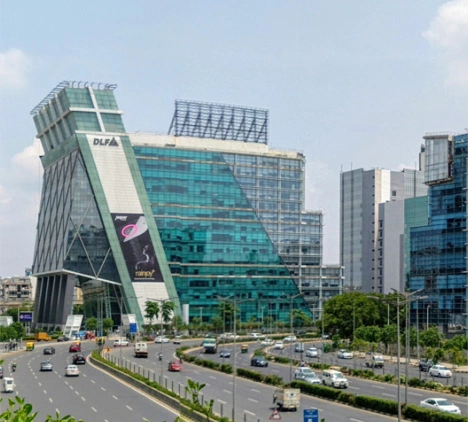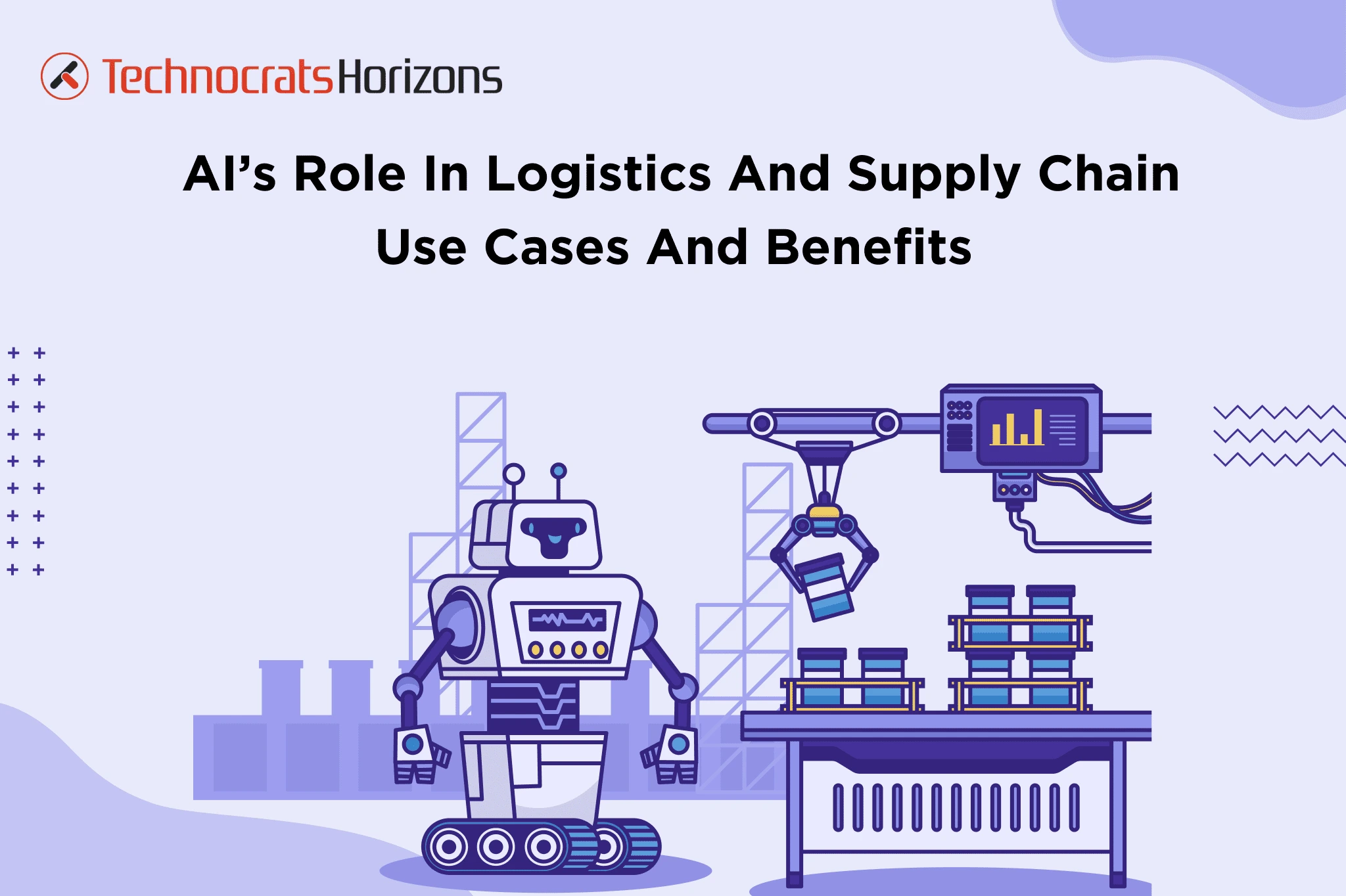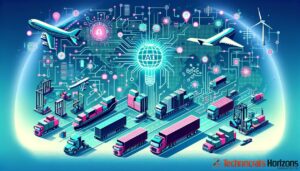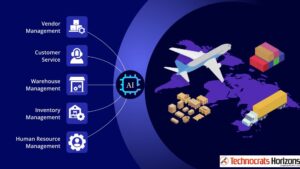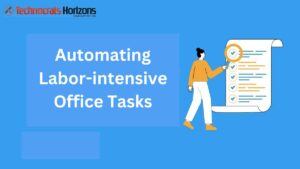In the past, AI was just something we saw in movies but today it is everywhere. AI in logistics, production lines, inventory management, and supply chain among others, nothing can escape its impact on the commerce sector.
Think back to when we thought machines like these couldn’t exist. But the digital transformations many businesses are undergoing today are starting to shift this around. AI in logistics and transportation can help you forecast demand, track orders, anticipate trends, and minimize errors.
Here, in this blog post, we will explore how artificial intelligence (AI) could enhance logistics and inventory control in various ways. We will also discuss the use of AI in inventory management systems and why AI is changing the logistics industry.
Explore the Role of AI in Supply Chain and Logistics
Nobody could deny the impact AI is having across industries due to its high efficiency and accuracy. AI plays a disruptive role in transforming organizations and automating critical processes.
Integrating AI into business solutions can elevate supply chain and logistics processes to more sophisticated and efficient methods. Strategically managing inventories for transportation and warehouse management based on demand forecasts results in effective and well-managed manufacturing and distribution.
Businesses that have adopted AI in logistics from the outset can now compete confidently in a changing market, bringing the era of unparalleled customer focus and efficiency. AI-powered workflows help organizations improve revenue while reducing expenses associated with supply chain and logistics operations.
Consequently, developing and implementing unique supply chain and logistics software solutions enhances productivity, streamlines the entire supply chain ecosystem, and drives logistics expansion.
Unlock the Future of Supply Chain with AI Insights!
Benefits Of AI in Logistics and Supply Chain
Till now, we discussed the role of AI in the supply chain and logistics business. Now, let’s talk about the benefits of using AI for logistics and supply chain.
Improved Forecasting Analysis
Despite being a mature industry, logistics is evolving gradually. Even with years of experience, there is no guarantee of error-free analysis.
Despite their precision, people still have limitations. However, AI in the supply chain provides a solution. AI in logistics can refine the analysis and enhance relevant data. By integrating crucial data into the database, You can perform a more thorough analysis of estimates and future demand.
AI models are instrumental here. They conduct data analysis across various levels and periods, going beyond mere data collection. AI programs rigorously analyze vast datasets to draw insights and forecasts, identifying potential bottlenecks that could develop into issues in the next six months.
Furthermore, employing machine learning in inventory management and related techniques to analyze large datasets ensures extremely low error rates, optimizing human resources usage. Predictive analysis enables strategic shipment planning with optimal routes, streamlining the entire process. Additionally, well-informed decisions about various transportation modes can maximize your results.
Utilizing Space Efficiently
While there are countless ways to pack a shipping container, the process is far from simple. Even if you meticulously choose every possible combination for loading, you’re likely to miss something, and it can be very time-consuming.
AI in logistics can be incredibly helpful in creating 3D models that guide the efficient loading of as many goods as possible into a given space. This can help your business reduce both shipping costs and the number of containers used, thereby lowering expenses and increasing revenue.
Fraud Prevention & Identification
Since its inception, AI has been used to detect and prevent fraud. A lot of the time shipments can be manipulated, especially if they involve paperwork or human intervention. By using AI for inventory management and supply chain, you can verify all details at every stage to avoid any manipulation or misrepresentation.
You can do this with data analysis and monitoring of suspicious or unusual activities. This helps businesses avoid being defrauded and losing money, thereby safeguarding their reputation.
Reduction in Delivery Time
As mentioned earlier, the use of AI in logistics and supply chains reduces the need for manual labor, making processes faster, safer, and more efficient overall. This ensures timely delivery of goods to customers following contracts. This is how companies like Amazon can deliver orders within a day to their Prime members.
Automated solutions effortlessly eliminate operational bottlenecks in the value chain, accelerating traditional warehouse operations to meet delivery targets. These insights can be derived from the data generated by using AI in logistics and supply chains. It also helps forecast areas of high demand and ensures that no single site is overloaded with excessive cargo or faced with prolonged stockouts.
Providing Advanced Data and Supply Chain Insights
Artificial intelligence leverages nearly real-time data from the supply chain. This contributes to reduced waste, efficiency gains, and savings in time and money. It also enables companies to respond promptly by providing real-time data on inventory locations and levels.
Thanks to this information, you no longer have to wait until the end of the month or quarter to determine the amount of stock at each location, enabling quick decision-making. Supply chain scheduling is vital for coordinating commodity deliveries on specific days and times. Similarly, insights gleaned from supply chain analytics aid in decision-making for businesses. Simply put, the usage of artificial intelligence in supply chain systems is the key to improving overall efficiency.
Unlock Next-Level Data Insights for Your Supply Chain!
Improved Inventory Control Accuracy
Manufacturers are utilizing AI’s capabilities to more precisely and effectively control their inventory levels. For instance, AI-powered forecasting systems can use inventory data provided by downstream customers to estimate their demand. If the system detects a decline in customer demand, it adjusts the manufacturer’s demand projections accordingly.
Manufacturers and supply chain managers are also increasingly employing computer vision systems, mounting cameras on supply chain equipment, racks, vehicles, and even drones, to count goods in real time and monitor warehouse storage capacity. AI in transportation and logistics also automates the creation, updating, and extraction of data from inventory records, logging these operations in inventory ledgers.
Less Waste and Fewer Mistakes
Overall, AI in logistics can detect abnormal behavior in humans and robots much earlier than humans can. For this reason, manufacturers, warehouse managers, and shipping companies are teaching algorithms to identify inefficiencies in their processes, mistakes made by employees, and defects in their products.
Computer vision systems use AI to inspect work and reduce returns, recalls, and rework. This system can prevent time and material waste by identifying errors made by employees and machines before products are assembled or shipped to the wrong location.
Furthermore, intelligent systems can perform root cause analysis, analyzing vast amounts of data to identify patterns that explain malfunctions and enable teams to address issues more quickly and effectively.
In addition, AI is integrated directly into ERP systems, helping businesses avoid costly billing and payment errors by managing financial transactions as goods move through the supply chain.
Enhanced Sustainability of the Supply Chain
AI has the potential to enhance the sustainability of supply networks and reduce their negative environmental impacts by improving operational efficiencies. For example, ML-trained models can optimize truckloads and delivery routes, ensuring vehicles use less fuel while transporting supplies. AI in supply chain systems can also minimize product waste across various stages of the supply chain. AI-driven production planning helps prevent factories from overproducing by analyzing historical inventory levels, current demand estimates, and real-time machine maintenance statuses.
AI also helps to provide insights helping bridge towards a circular economy, a situation in which resources are reused and recycled. By using AI when planning the supply chain together with sourcing tools, one can become transparent and compliant with socially just and environmentally sustainable practices like ensuring transparent living wages for employees.
Increased Security
Automation driven by artificial intelligence (AI) can improve planning and warehouse management, thereby enhancing material and worker safety. AI can analyze workplace safety data and alert manufacturers to potential risks. It can also establish appropriate feedback loops and perform preventive maintenance, adjusting inventory parameters, and updating operations. This way, AI in logistics and supply chain enables you to respond quickly and effectively to maintain safety standards and secure warehouses.
Use Cases Of AI in Logistics and Supply Chain
AI has undeniably impacted multiple industries in the past few years and for good reason. It has found many applications due to its versatility and ability to handle crucial tasks with high accuracy levels. Let’s explore the widely known use cases of AI in logistics and supply chain:
AI for Inventory Management
AI is used across industries such as manufacturing, retail, and healthcare with an intent to optimize inventory management. Retail giants like Amazon use AI to ensure products are available when needed which results in enhanced consumer satisfaction and operational efficiency.
For instance, Amazon uses AI to forecast product demand based on historical performance, consumer patterns, and market data. This information is used to optimize inventory levels and streamline inventory management processes. Amazon employs various AI-based inventory management techniques, including computer vision, natural language processing, and machine learning.
Amazon utilizes machine learning in inventory management to understand social media buzz and consumer reviews. This data helps in detecting trends and the demand for new products. For instance, Amazon can forecast that demand for a product will rise if it is getting a lot of positive reviews.
Amazon tracks the flow of goods via its facilities using machine vision. This way, Amazon optimizes inventory levels and detects bottlenecks. For instance, Amazon can easily determine that a product is not moving as rapidly as anticipated and take action to optimize inventory management KPIs by identifying a problem with the supply chain.
AI for Demand Forecasting
Artificial Intelligence is used to predict product and service demand, optimizing production schedules, pricing, and inventory levels.
Walmart, for example, uses AI to forecast product demand in its stores. The company employs AI techniques such as computer vision, natural language processing, and machine learning to analyze past sales data accurately. This precision helps Walmart adjust inventory levels precisely, avoiding inventory shrinkage and ensuring optimal stock levels that match market demands. For businesses involved in production, using AI in logistics and supply chain can also help you manage the predicted demands.
Know the Power of AI in Logistics & Supply Chain!
AI for Route Optimization
Artificial intelligence algorithms analyze vast amounts of data, including traffic patterns, weather conditions, and delivery locations, to find the most efficient routes for delivery vehicles. As a logistics company, this can help you reduce the number of vehicles needed for deliveries, save on fuel costs, and shorten delivery times.
UPS uses an AI-powered navigation system called ORION (On-Road Integrated Optimization and Navigation) to optimize delivery routes for its drivers. Since its implementation in 2011, ORION has saved approximately 100 million delivery miles and 10 million gallons of fuel.
AI for Real-time Tracking
You can gain visibility into the location and condition of shipments and cargo by using AI for logistics to track product movements in real time. This can reduce the risk of missing or damaged goods and improve operational efficiency.
Maersk uses an AI-driven tracking system called Remote Container Management to monitor the position, temperature, and humidity of its cargo in real-time. Using AI in logistics and transportation has increased the efficiency of Maersk’s supply chain and reduced the risk of cargo damage.
AI for Automated Warehouses
Amazon provides a prime example of maximizing the use of AI in logistics with its automated fulfillment center network, known for processing orders swiftly using cutting-edge technology. Currently, robots manage a significant portion of Amazon’s vast inventory, ranging from everyday essentials to unique products.
Amazon operates more than 750,000 robots across over 300 fulfillment centers worldwide. In October 2023, Amazon announced the introduction of two new robots to enhance operations: Sequoia and Digit.
Sequoia enables Amazon to swiftly detect and stock incoming merchandise at its fulfillment centers, improving speed by 75% compared to existing methods. It also accelerates order processing times by up to 25%.
Digit is capable of maneuvering, grasping, and manipulating objects in tight corners and warehouse spaces using innovative methods. Designed with human-scale dimensions and capabilities, Digit represents a significant advancement in mobile manipulator systems. Amazon foresees expanding the use of similar systems in collaboration with its workforce to enhance operational efficiency. Utilizing the same framework and AI in logistics and supply chain, you can also maximize efficiency in operations.
Automating Labor-intensive Office Tasks
Hyperautomation, also known as intelligent business process automation, involves automating processes end-to-end by combining technologies such as artificial intelligence (AI), process mining, and robotic process automation (RPA).
You can automate several back-office processes using these AI-based inventory management and logistics technologies:
- Transportation scheduling
- Pipeline organization for cargo
- Personnel assignment and management
- Package tracking in warehouses
- Report generation
RPA solutions enable logistics organizations to automatically generate reports regularly, ensuring management is informed and all employees are aligned with company goals. These solutions simplify report generation, content examination, and distribution via email to relevant parties.
Wrapping Up
AI in logistics and supply chain is a force to be reckoned with. It presents incredible opportunities to automate repetitive tasks, enhance productivity, and reduce costs.
Businesses across various sectors can leverage AI in logistics to gain a competitive edge. Whether in traditional logistics or eCommerce, all organizations stand to benefit from it.
Technocrats Horizons stands out as a premier AI application development company, providing organizations worldwide with access to the latest and most innovative technologies. Our AI technologists at Technocrats meticulously assess your goals and business needs to deliver optimal solutions.
Our team of AI specialists is equipped with cutting-edge technologies including Machine Learning, Deep Learning, Artificial Neural Networks, and Cognitive Computing. Contact our experts today to discover how Artificial Intelligence solutions can give your business a decisive advantage over competitors.
Reshape Your Customer Experiences With AI!
AI is the future of technology! Adapt Now!
Get a free consultation to see how our AI experts can transform your business processes.


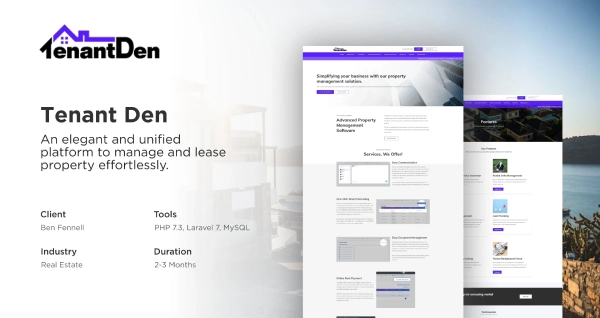


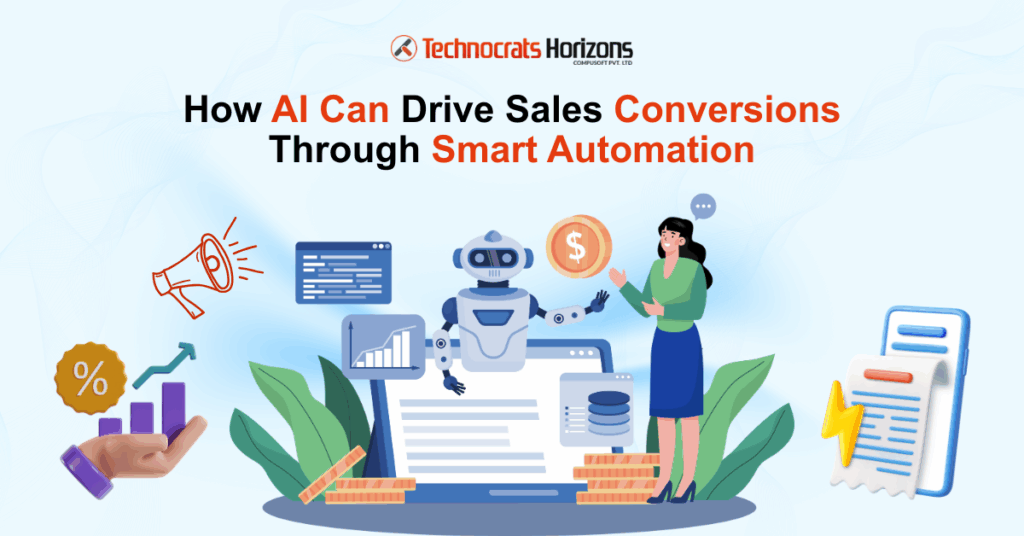
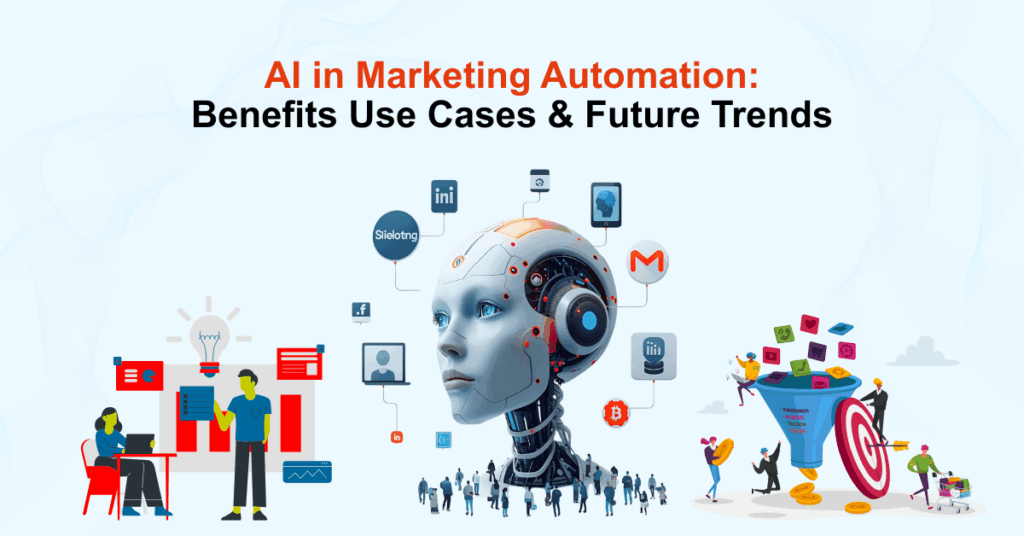




 Request a
Request a

















